-
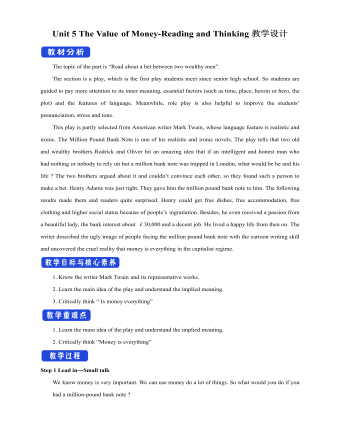
新人教版高中英语必修3Unit 5 The Value of Money-Reading and Thinking教学设计一
Everybody wants to get wealth.In today’s material world,making money or becoming wealthy symbolizes a person’s success and capability. Many people just make every effort, pay any price to attain greater wealth. With money,they can buy nice, large apartments in nice neighborhood. With money they can own luxurious cars. Wealth seems to bring all happiness in life.But is wealth the only road to happiness? Not really. There are many things in the world, which are beyond the means of money, such as friendship, love, health and knowledge. People are so preoccupied with struggling for money that they have no time or would not take the time to form or maintain friendship. What happiness can they feel living as lonely miserable creatures without love or friends in the world even if they accumulate tremendous wealth?In my opinion, people can’t do anything without money, but money is not everything. What money will bring you depends on your personal belief and goal in life. If you are kind enough to help others, especially the poor, money is a good thing to you. With it, you can do much more for the benefit of people and your country, and it will add to your own happiness. If you want money just for your own needs, you’ll never be satisfied or happy. In a word,you should have money spent for more people. Only then can money be the source of your happiness.Step 8 Homework4 students in a group, one acts Roderick, one Oliver, one servant and the fourth one acts Henry Adams, then listen to the tape, pay more attention to the difference between American English and British English in pronunciation, stress, tone.
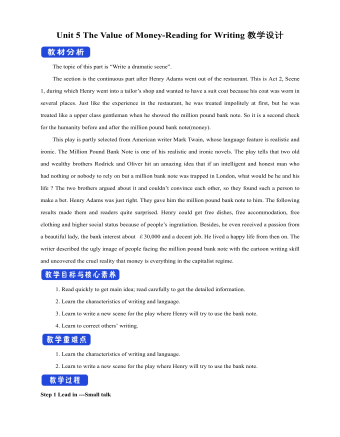
新人教版高中英语必修3Unit 5 The Value of Money-Reading for Writing教学设计二
2. 您能看到, 我头发太长了。You can see that my hair is much too long.3. 无论什么时候, 只要您想回来就回来。Please come back whenever you want.4. 您仅有很少的头发要理! You only have too little hair to cut !5. 为您服务是我的荣幸!It is my honour to serve you!Step 9 Writing(Henry is walking down the street when he sees a sign for a place that cuts hair. He decides to have it cut. )H=Henry B=BarberH: Good afternoon, I’d like to have my hair cut, if I may. (The barber looks at Henry’s hair and continues cutting another man’s hair. ) Er, I’d really like a haircut. As you can see it’s much too long. B: (in a rude manner) Yes, I can see that. Indeed, I can. H: Fine, well, I’ll have a seat then. (He sits in one of the barber’s chairs. The barber turns to look at Henry. )B: It’s quite expensive here, you know! Are you sure you can afford it?H: Yes. I think so. (After his hair is cut, the barber tells Henry how much he must pay. Henry shows the barber the bank note. )B: Why Mr. . . (looks shocked)H: Adams. Henry Adams. I’m sorry. I don’t have any change. B: Please don’t worry! (wearing a big smile) Nothing to worry about! Nothing at all! Please come back whenever you want, even if you only have too little hair to cut! It will be my honour to serve you!Step 10 Pair workExchange drafts with a partner. Use this checklist to help your partner revise his/her draft.1. Are all the elements of a play included and in good order ?2. Do the character use suitable language ?3. Are the stage directions clear and useful ?4. Is the plot clear and exciting enough ?
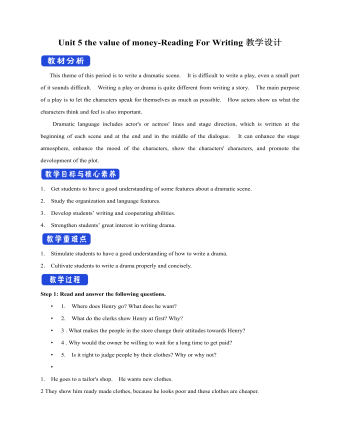
新人教版高中英语必修3Unit 5 the value of money-Reading For Writing教学设计一
【参考范文】Narrator:(Henry is smiling as he leaves the restaurant. As he is walking down the street, he sees a sign for a place that cuts hair. He decides to get it cut. )H=Henry;B=Barber;R=rude manH:Good afternoon, I'd like to get a cut, if I may. (The barber looks at Henry's hair and continues cutting another man's hair. )Er, I'd really like a haircut. As you can see it's much too long. B:(in a rude manner) Yes, I can see that. Indeed, I can. H:Fine, well I'll have a seat then. (He sits in one of the barber's chairs. The barber turns to look at Henry. )B:It's quite expensive here, you know!Are you sure you can afford it?H:Yes. I think so. (In comes the rude man. )R:Hey you there. I need a haircut quickly. Can you do me straightaway?B:All right, then, get in the chair and I'll see what I can do. R:Thank you. (sits down in one of the barber's chairs)H:Excuse me, but I was here first. Aren't you going to do my hair first?B:This man's in a hurry. H:Well so am I!I insist that you cut my hair first. B:OK, but I'll have to be quick. This gentleman is waiting. H:Thank you. (They both become quiet. After his hair is cut, the barber tells Henry how much he must pay. Henry shows the barber the bank note. )B:Why, Mr . . . (looks shocked)H:Adams. Henry Adams. I'm sorry, I don't have any change. R:You're that Mr Adams! Well,I'm glad I waited or I might never have known it was you. B:Why, Mr Adams, please don't worry!(wearing a big smile) Nothing to worry about!Nothing at all!Please come back any time, even if you only need too little hairs cut!It will be my honour to serve you!
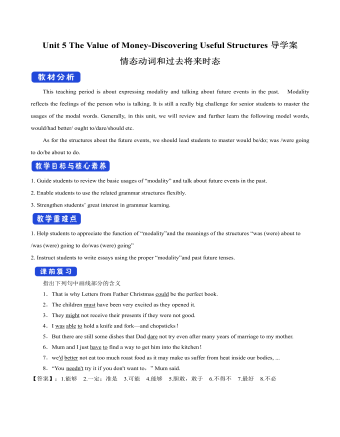
新人教版高中英语必修3Unit 5 The Value of Money-Discovering Useful Structures导学案
4.They were going to find someone to take part in their bet when they saw Henry walking on the street outside.[归纳]1.过去将来时的基本构成和用法过去将来时由“would+动词原形”构成,主要表示从过去某一时间来看将要发生的动作(尤其用于宾语从句中),还可以表示过去的动作习惯或倾向。Jeff knew he would be tired the next day.He promised that he would not open the letter until 2 o'clock.She said that she wouldn't do that again.2.表示过去将来时的其他表达法(1)was/were going to+动词原形:该结构有两个主要用法,一是表示过去的打算,二是表示在过去看来有迹象表明将要发生某事。I thought it was going to rain.(2)was/were to+动词原形:主要表示过去按计划或安排要做的事情。She said she was to get married next month.(3)was/were about to+动词原形:表示在过去看来即将要发生的动作,由于本身已含有“即将”的意味,所以不再与表示具体的将来时间状语连用。I was about to go to bed when the phone rang.(4)was/were+现在分词:表示在过去看来即将发生的动作,通常可用于该结构中的动词是come,go,leave,arrive,begin,start,stop,close,open,die,join,borrow,buy等瞬间动词。Jack said he was leaving tomorrow.
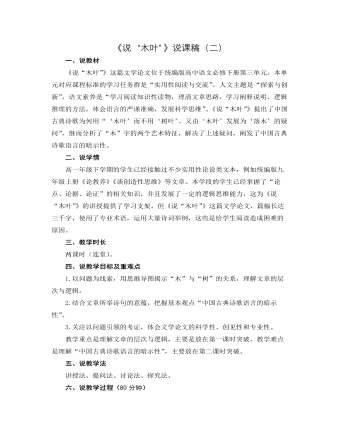
《说“木叶”》说课稿(二) 2021-2022学年统编版高中语文必修下册
一、说教材《说“木叶”》这篇文学论文位于统编版高中语文必修下册第三单元。本单元对应课程标准的学习任务群是“实用性阅读与交流”,人文主题是“探索与创新”,语文素养是“学习阅读知识性读物,理清文章思路,学习阐释说明、逻辑推理的方法,体会语言的严谨准确,发展科学思维”。《说“木叶”》提出了中国古典诗歌为何用“‘木叶’而不用‘树叶’、又由‘木叶’发展为‘落木’的疑问”,继而分析了“木”字的两个艺术特征,解决了上述疑问,阐发了中国古典诗歌语言的暗示性。二、说学情高一年级下学期的学生已经接触过不少实用性论说类文本,例如统编版九年级上册《论教养》《谈创造性思维》等文章。本学段的学生已经掌握了“论点、论据、论证”的相关知识,并且发展了一定的逻辑思维能力,这为《说“木叶”》的讲授提供了学习支架。但《说“木叶”》这篇文学论文,篇幅长达三千字,使用了专业术语,运用大量诗词举例,这些是给学生阅读造成困难的原因。
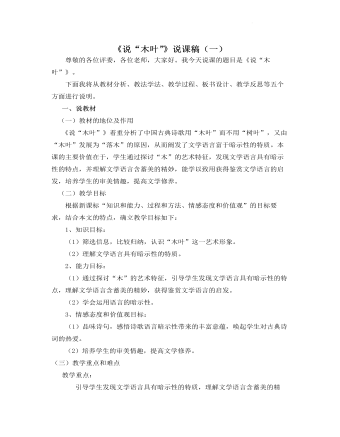
《说“木叶”》说课稿(一) 2021-2022学年统编版高中语文必修下册
这五个问题,主要从学情出发,由浅入深,从感知到理论,培养学生的鉴赏能力。第三环节:延伸探究、展示成果(多媒体显示)走出文本,引入课外同类文学现象,让学生能够触类旁通,举一反三,把教材作为一个例子,让学生在深入的文学鉴赏中再次获得语言的审美。同学们初步掌握了文学语言具有暗示性的性质后,还需巩固、提升鉴赏能力!这里我采取的方法是:引导学生认真阅读文本,经小组合作探究后,得出本组的鉴赏成果并加以展示,这里重在培养学生的理解能力和分析综合能力。问题是:1、 请结合下面三首词的意境,选用残红、落红、乱红填空。2、 阅读下面这些句子,理解“燕”在词语中的暗示意义。该环节充分体现了 “ 教师为主导,学生为主体”的原则。老师的适时点拨,让学生的鉴赏思路更加清晰。学生通过合作探究,理解能力和分析综合能力得到了提升。
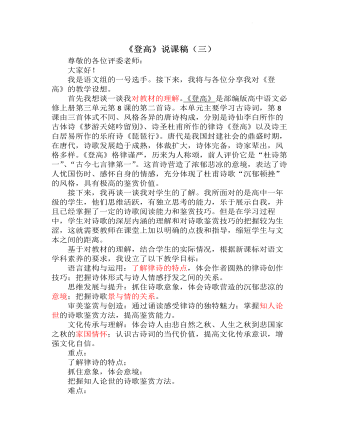
《登高》说课稿(三)2022-2023学年统编版高中语文必修上册
④结合杜甫的身世遭遇,你认为这里的“艰难苦恨”包含着哪些情感?第五步是拓展延伸对比阅读李白的《梦游天姥吟留别》,讨论诗体形式与诗人情感抒发之间的关系。第六步是达标检测我将紧扣考试题型,以理解性默写的形式,当堂检验学生对诗歌的掌握情况第三环:课后跟踪课后作业:①背诵并默写诗歌②鉴赏诗歌《秋兴八首》 (其一) ,找出诗歌所用意象,体会意境,表达情感。玉露凋伤枫树林,巫山巫峡气萧森。江间波浪兼天涌,塞上风云接地阴。丛菊两开他日泪,孤舟一系故园心。寒衣处处催刀尺,捣衣砧上拂还来。最后,我来说一说我的板书设计,我的板书设计简洁明了,清晰直观,能够突出本课的重点和难点。以上就是我本说课的全部内容,再次感谢各位考官的聆听!
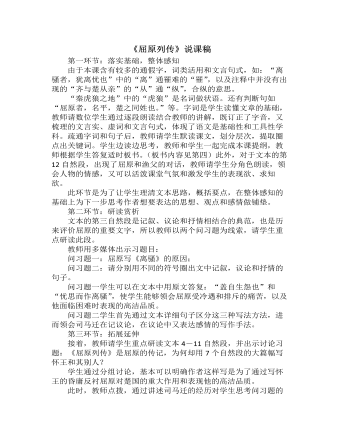
《屈原列传》说课稿 2021—2022学年统编版高中语文选择性必修中册
第一环节:落实基础,整体感知由于本课含有较多的通假字,词类活用和文言句式,如:“离骚者,犹离忧也”中的“离”通罹难的“罹”,以及注释中并没有出现的“齐与楚从亲”的“从”通“纵”,合纵的意思。 “秦虎狼之地”中的“虎狼”是名词做状语。还有判断句如“屈原者,名平,楚之同姓也。”等。字词是学生读懂文章的基础,教师请数位学生通过逐段朗读结合教师的讲解,既订正了字音,又梳理的文言实、虚词和文言句式,体现了语文是基础性和工具性学科。疏通字词和句子后,教师请学生默读课文,划分层次,提取圈点出关键词。学生边读边思考,教师和学生一起完成本课提纲,教师根据学生答复适时板书。(板书内容见第四)此外,对于文本的第12自然段,出现了屈原和渔父的对话,教师请学生分角色朗读,领会人物的情感,又可以活泼课堂气氛和激发学生的表现欲、求知欲。
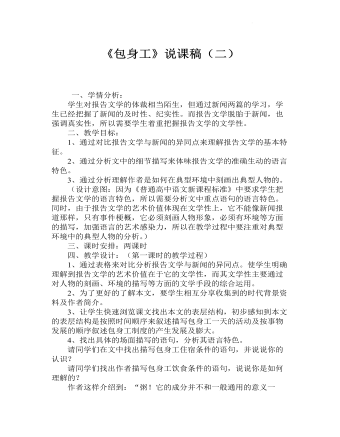
《包身工》说课稿(二) 2021-2022学年统编版高中语文选择性必修中册
3、通过分析理解作者是如何在典型环境中刻画出典型人物的。(设计意图:因为《普通高中语文新课程标准》中要求学生把握报告文学的语言特色,所以需要分析文中重点语句的语言特色。同时,由于报告文学的艺术价值体现在文学性上,它不能像新闻报道那样,只有事件梗概,它必须刻画人物形象,必须有环境等方面的描写,加强语言的艺术感染力,所以在教学过程中要注重对典型环境中的典型人物的分析。)三、课时安排:两课时四、教学设计:(第一课时的教学过程)1、通过表格来对比分析报告文学与新闻的异同点。使学生明确理解到报告文学的艺术价值在于它的文学性,而其文学性主要通过对人物的刻画、环境的描写等方面的文学手段的综合运用。2、为了更好的了解本文,要学生相互分享收集到的时代背景资料及作者简介。3、让学生快速浏览课文找出本文的表层结构,初步感知到本文的表层结构是按照时间顺序来叙述描写包身工一天的活动及按事物发展的顺序叙述包身工制度的产生发展及膨大。
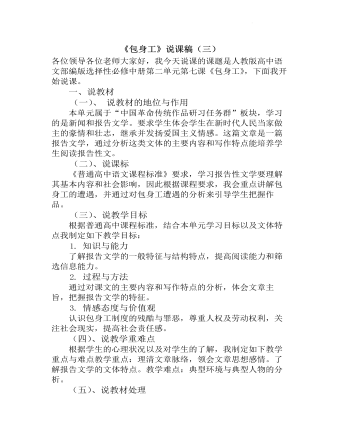
《包身工》说课稿(三) 2021-2022学年统编版高中语文选择性必修中册
一、说教材(一)、 说教材的地位与作用本单元属于“中国革命传统作品研习任务群”板块,学习的是新闻和报告文学。要求学生体会学生在新时代人民当家做主的豪情和壮志,继承并发扬爱国主义情感。这篇文章是一篇报告文学,通过分析这类文体的主要内容和写作特点能培养学生阅读报告性文。(二)、说课标《普通高中语文课程标准》要求,学习报告性文学要理解其基本内容和社会影响,因此根据课程要求,我会重点讲解包身工的遭遇,并通过对包身工遭遇的分析来引导学生把握作品。(三)、说教学目标根据普通高中课程标准,结合本单元学习目标以及文体特点我制定如下教学目标:1. 知识与能力了解报告文学的一般特征与结构特点,提高阅读能力和筛选信息能力。2. 过程与方法通过对课文的主要内容和写作特点的分析,体会文章主旨,把握报告文学的特征。3. 情感态度与价值观认识包身工制度的残酷与罪恶,尊重人权及劳动权利,关注社会现实,提高社会责任感。
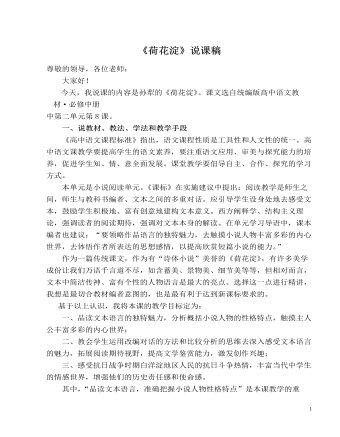
《荷花淀》说课稿 2020-2021学年统编版高中语文选择性必修中册
教师深情旁白,歌手的动情演唱,让学生会沉浸在夫妻之情、家国之爱的深深思索中,此时的课堂气氛应是沉静的。学生在这种情感体验中,一定能写出很精彩的对话]为了将这种课堂的高潮气氛不至于因学习问题的转移而跌落,我又设计了过渡语,在同学们的思绪有点紊乱中(我预想此时同学们的思绪是这样的),教师说:毕竟,藕断丝连的妇女们,对丈夫的不辞而别心存依恋。或许她们还有许多悄悄话还未来得及向自己心爱的丈夫表白;或许她们为丈夫的安全茶饭不思;或许她们有一日不见,如隔三秋的感觉。因此,几个青年妇女就聚在水生家里商量探夫的事。虽然我们未能参与其中,但我们可以听其声,见其人,感其情。不信请……)(这就实现了课堂教学环节的自然巧秒过渡,也同样展示了我的上课风格)
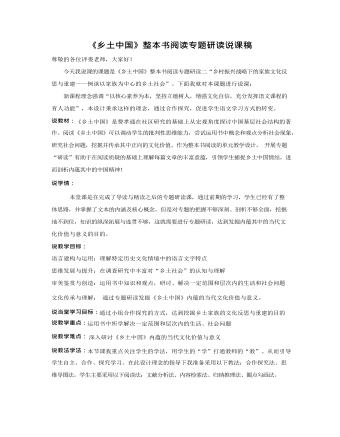
《乡土中国》说课稿 2021-2022学年统编版高中语文必修上册
活动一:整体感知,梳理要点新修订《课程标准》指出:重视学生的思维发展与提升,如直觉思维、形象思维、抽象思维等。为此,我设计了“梳理要点、绘制思维导图”两个部分,引导学生在阅读中整体感知文本。1、梳理章节要点,明确内容要素《家族》:以西洋家庭特点为对照,分析中国乡土社会家庭的特点。《男女有别》:主要讨论乡土社会感情定向的问题,偏向同性交往,遏制男女交往。2、展示思维导图,凸显整体关联引导同学制作多种思维导图:流程图式、树状图式、爪形图式活动二:走进文本,深化认知新修订《课程标准》指出:学会语文运用的方法,有效地提高语文能力,并在学习语言文字运用的过程中促进方法、习惯及情感、态度与价值观的综合发展。所以在教学中我引导学生掌握整本书阅读的基本方法,即以速读、跳读的方式地毯式地搜索书中关于“中西家庭差别”的内容,得出乡土家族的六个方面的特点,学生分别结合生活中的现象阐述了这六个方面的特点在生活中的具体体现。
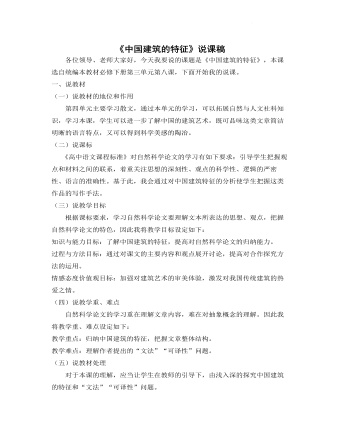
《中国建筑的特征》说课稿 2021—2022学年统编版高中语文必修下册
(二)初读课文,整体感知首先教师对作者进行简单介绍,再要求学生速读课文,让学生初步感知课文内容,归纳全文思路,边读边思考PPT上的问题。问题:全文可以分成几部分?此环节意在激发学生的学习主动性,培养学生的自学能力。读毕,我会对学生的自学情况进行检查反馈,鼓励学生踊跃发言,说出自己理解的写作思路,最后教师对学生的答案进行概括和总结,此环节能够让学生对中国建筑的特征整体把握,夯实学习本文的基础,同时感知课文,理清文章脉络,实现长文短教,为析读本文作好铺垫。(三)析读课文,质疑问难此环节是教学的重要阶段,在这里,我会以新课标为基准,做到阅读指向每一个学生的个体阅读,同时在教学过程中遵循启发性,循序渐进性的原则。此环节运用小组合作学习法、讨论法和问答法分析中国建筑的特征。同学每四人为一小组讨论PPT上展示的问题。
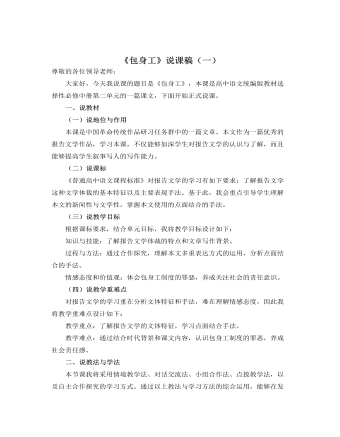
《包身工》说课稿(一) 2021-2022学年统编版高中语文选择性必修中册
首先请同学设想:“如果你是作者,当你准备写一篇以包身工为题材的文章时,会从哪些方面选材?”而“本文又是如何将这些材料组织起来的?”这一环节能够使学生参与到教学过程中来,通过问题能够引导学生关注本文的选材类型和表达方式,区分文中穿插的感性、理性材料,从而理解报告文学兼文学性、议论性于一体的文学特质。然后请同学阅读表现包身工起床情形的场面描写(1-6段),并引导学生分析该段表达效果;再请同学们阅读“芦柴棒”被虐待段(16-20段),并引导同学们比较两个片段在选材上有何区别,进而归纳点面结合的手法的艺术效果。最后请学生找出文中其他运用点面结合手法的段落,并尝试自主分析。这一环节能够引导学生直观地感受本文场面描写的作用,并分析点面结合手法的艺术效果,同时也让学生通过练习探究掌握分析该手法的方法。
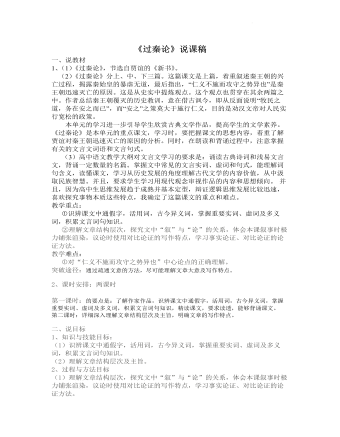
《过秦论》说课稿 2021—2022学年统编版高中语文选择性必修中册
三、教学方法为了突出重点,突破难点,完成教学目标,选择行之有效的教学方法是非常关键的。根据课程标准的要求和本节课的特点,为了关注学生的个体差异和不同的学习需求,充分调动学生学习的积极性,培养学生阅读和分析文章的能力,我主要采用以下的教学方法:1、悬念导入法。用悬念导入能激发起学生对文言文阅读的兴趣,充分调动学生学习的主动性。2、根据教师主导作用与学生主动性相结合的原则,选择了以语言传递信息为主的方法,讲授法。四、学法通过初中的学习,学生对古文知识已经有了一定的掌握,但是对这种古代散文比较少见,特别是叙史和议论结合的写法更是陌生。所以学习这篇课文的时候,通过反复地诵读,分析句型,对比句型的意思,达到疏通文意,这样,学生通过朗读理解法、质疑提问法、自主讨论探究法能复述课文,了解文章层次,理解文章主旨含义。
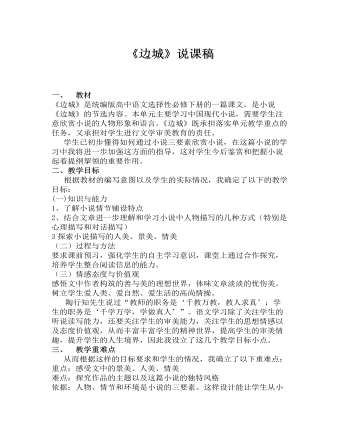
《边城》说课稿2021-2022学年统编版高中语文选择性必修下册
(重点突破一)1、分析环境描写 探讨边城的景美?(重点突破二)2、分析人物形象 探讨边城的人性美和人情美?至此,以三要素为切入口,文章的重点已分析完毕,下一个步骤就是突破难点。第二课时首先回顾上节课所讲的内容 (5分钟)(四)(难点突破)探究主题我设计了这样两个问题:1、小说表达了什么样的主题?(5分钟)2、有人说:《边城》从头到尾都隐藏着一种淡淡的愁绪,说说你的认识?从这篇小说中你可以看出沈从文先生的哪些显著的写作特点?(15分钟)这是两个定向设问的探究题,目的性很明确,就是为了突破难点,探究文章主旨。为了帮助学生理解文章的主旨,我用多媒体向学生 介绍《边城》的写作背景,给出“边城”的解题。对于第一个题,学生的答案可能会有很多种,比如“美”“爱”“纯”“和谐”“自然”等等,只要能基本概括,理由充足即可。
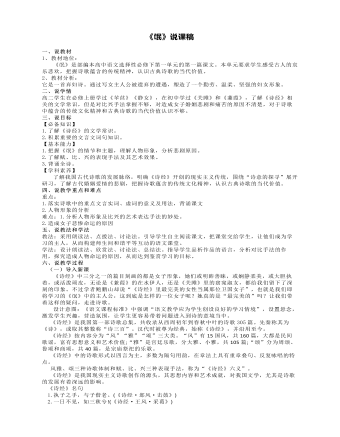
《氓》说课稿-2020-2021学年统编版高中语文选择性必修下册
“将子无怒”急于成婚,至于发怒,表现出急躁的性格特征;“二三其德”,又表现出他品德的败坏;“言既遂矣,至于暴矣”婚后的暴躁,婚前的热烈,婚后的离弃,两相对照,则揭示了他的虚伪自私。总之,氓是个性情狂暴、违背诺言、始爱终弃、不负责任、自私的负心汉。设计意图:用流行语概念引导学生去解读不同作品中的人物,培养学生比较分析的能力。3、探究《氓》中造成女子婚姻悲剧和痛苦的原因有哪些?个人原因:①氓的三心二意,不负责任。文中说“女也不爽,士贰其行”,女子怨恨的正是自己甘心贫困,辛苦操劳,多年如一日,但是最终还是被丈夫遗弃。②女子在经济上政治上处于附属地位。她生活天地狭小,生活的幸福与否全寄托在丈夫身上。如果遇上个对感情对家庭不负责任的丈夫,那她的悲剧是不可避免的。③性格悲剧。在男权社会中,女子在婚前行为草率,她与氓的恋爱缺乏牢固的思想基础,对氓的人品认识不足,认人不清导致的悲剧。社会的原因:
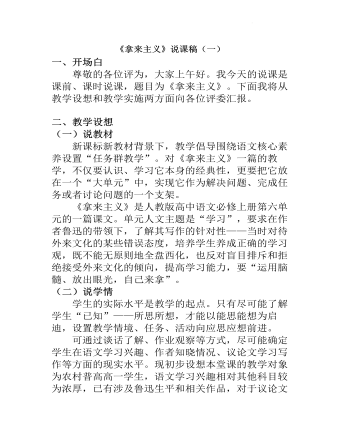
《拿来主义》说课稿(一) 2022-2023学年统编版高中语文必修上册
(三)说目标鉴于以上学情分析,结合单元学习任务群——思辨性阅读与表达的定位,确定本课教学目标为通过设置任务情境,带领学生在活动中认识表达的有针对性、论述的层次逻辑性以及感受文章蕴含的批判力量。其中以表达的有针对性为教学重点,以论述的层次逻辑性为难点。(四)说理念根据课标和教材特点,结合学情,授课将依托“学为中学理论”“建构主义学习理论”和“最近发展区理论”等,积极开展阅读与鉴赏、表达与交流、梳理与探究等语文实践活动提升学生语文核心素养。三、教学实施(一)设定学习情境为引导广大学生合理对待外来文化,学校辩论社拟设定辩题——如何正确对待外来文化展开辩论。有同学说坚决抵制外来文化(正方),也有同学说要积极吸收(反方)……那么如果你是其中一位辩手,你将在《拿来主义》中如何撷取素材呢?
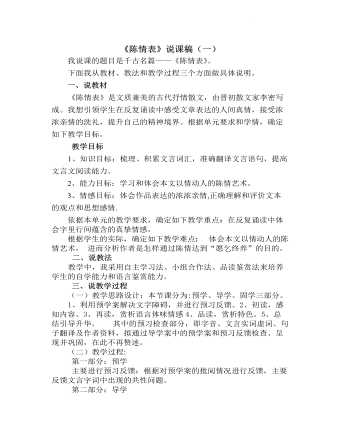
《陈情表》说课稿(一) 2021-2022学年统编版高中语文选择性必修下册
4、学习任务三:品读,赏析特色,深入探究。(解决“为什么这么陈情“的问题)文学史上,以获得“高难度”的险助而又收“高效率”奇功的,首推李密的《陈情表》。“抗君命”、“逆圣旨”,李密是为“辞不赴命”而上书的。让学生再读课文,结合导学案中的背景介绍,思考作者为什么这样陈情。 【方法导引】再读文本,深入思考作者除了从亲情入手打动晋武帝,还从哪些方面陈情以达到自己想要的效果?要求:独立思考,小组合作,梳理归纳,到黑板上展示。教师补充归纳:本文出于情,归于理,先动之以情,再晓之以理。李密是亡国旧臣,惹恼晋武帝,会被株连九族。先以祖孙相依为命的亲情凄切婉转的表明心意,唤起晋武帝的怜悯之心,再以“报国恩”“徇私情”的两难和朝廷以“孝”治国以及自己为官追求等,打消皇帝疑虑,最终提出先尽孝后尽忠的解决方案,以情动人,构思缜密。整篇《陈情表》密布着感情的浓云,陈情于事,寓理于情,凄恻动人。
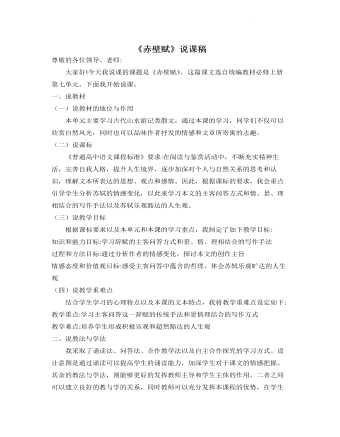
《赤壁赋》说课稿 2021-2022学年统编版高中语文必修上册
(三)赏析课文,品味哲理此环节重在解决本课的重点难点。首先,我运用问答法解决1.2两个问题。问答可以吸引学生注意,激发学生思维,培养学生概括和说话能力。通过学生的回答,即“固一世之雄也,而今安在哉”和“哀吾生之须臾,羡长江之无穷”以及“挟飞仙以遨游,抱明月而长终”这三个句子,最后明确答案:古今历史对比生悲、人生短暂和自然无穷对比生悲、理想与现实矛盾生悲;再以同样的方式分析第4段,通过教师提出问题,学生进行思考和回答这一过程,归纳出“水与月”、“变与不变”和“自然之无尽藏也”这三层哲理,最后得出是苏轼超然洒脱、乐观旷达的人生观劝慰了客人,从而达到第5段中“客喜而笑”的结果。设计两个问题的意图是让学生得以把握苏轼由疑惑沮丧到豁然开朗这一情感变化,从而更好的赏析本文。





















